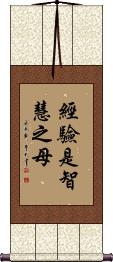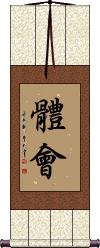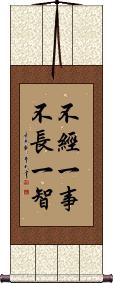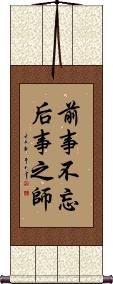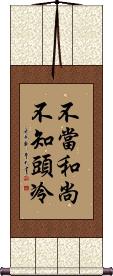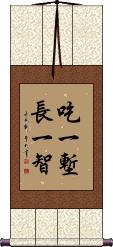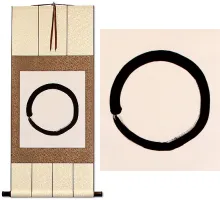Many custom options...
And formats...

Experience in Chinese / Japanese...
Buy an Experience calligraphy wall scroll here!
Personalize your custom “Experience” project by clicking the button next to your favorite “Experience” title below...
1. Experience is the Mother of Wisdom
3. Wisdom comes from Experience
4. Bad Experience, Caution Lingers
5. Schooled by Experience and Hard Knocks
6. Wisdom comes from Experience
7. Past experience is the teacher for the future
8. To Know Hardship, One Must Experience It
9. Each Time You Stumble and Fall, You Gain Experience and Wisdom
Experience is the Mother of Wisdom
It's been said that wisdom comes from good judgment, and good judgment comes from experience, while experience comes from a series of times when you used bad judgment.
經驗是智慧之母 is a Chinese proverb that makes the simplest connection between experience and wisdom.
See Also: Failure is the Mother of Success | Wisdom | Learn From Wisdom
Knowledge from Experience
Wisdom comes from Experience
不經一事 means “You can't gain knowledge without practical experience.”
This is the short form (first half) of a longer Chinese proverb. These 4 characters remind you that wisdom only comes from experience.
Bad Experience, Caution Lingers
A bird wounded by an arrow
傷弓之鳥 means “bird wounded by an arrow.”
Figuratively, this refers to a wounded or damaged person. It's very similar to the western proverb, “a person once bitten is twice shy.” To explain further, this is about someone who has become overly cautious due to a bad experience.
This phrase is used in Chinese, Japanese, and Korean.
Schooled by Experience and Hard Knocks
Wisdom comes from Experience
You can translate this 不经一事不长一智 Chinese proverb in a couple of ways.
The first is: You cannot gain knowledge without practice.
The second, and perhaps more popular way is: Wisdom comes from experience.
It literally means if you are inattentive to your affairs or situations you encounter, you will not gain or grow any wisdom or intellect.
Past experience is the teacher for the future
Past events not forgotten serve as teachers for later events.
The most literal translation to English of this ancient 前事不忘后事之师 Chinese proverb is:
“Past events not forgotten serve as teachers for later events.”
However, it's been translated several ways:
Don't forget past events, they can guide you in the future.
Benefit from past experience.
Past experience, if not forgotten, is a guide for the future.
Past calamity is my teacher.
A good memory for the past is a teacher for the future.
The remembrance of the past is the teacher of the future.
If one remembers the lessons of the past; They will serve as a guide to avoid mistakes in the future.
The origin:
This proverb comes from the 5th century B.C., just before the Warring States Period in the territory now known as China.
The head of the State of Jin, Zhi Bo, seized power in a coup. He did this with help from the armies of the State of Han and Wei. Instead of being grateful for the help from Han and Wei, he treacherously took the land of Han and Wei. Never satisfied, Zhi Bo employed the armies of Han and Wei to attack and seize the State of Zhao.
The king of Zhao took advice from his minister Zhang Mengtan and secretly contacted the Han and Wei armies to reverse their plans and attack the army of Zhi Bo instead. The plan was successful, and the State of Zhao was not only saved but was set to become a powerful kingdom in the region.
Zhang Mengtan immediately submitted his resignation to a confused king of Zhao. When asked why, Zhang Mengtan said, “I've done my duty to save my kingdom, but looking back at past experience, I know sovereign kings are never satisfied with the power or land at hand. They will join others and fight for more power and more land. I must learn from past experiences, as those experiences are the teachers of future events.”
The king could not dispute the logic in that statement and accepted Zhang Mengtan's resignation.
For generations, the State of Zhao continued to fight for power and land until finally defeated and decimated by the State of Qin (which led to the birth of the Qin Dynasty in 221 B.C.).
To Know Hardship, One Must Experience It
不當和尚不知頭冷 is a Chinese proverb that literally translates as: [One who has] not been a monk [does] not know [the feeling of a] cold head.
I need to explain that a Chinese Buddhist monk always has a shaved head, and thus a cold head in winter.
Figuratively, this means: One cannot know the true meaning of hardship until one has experienced it oneself.
This is an idiom in Chinese, so the figurative meaning is what people perceive when they hear or read this phrase. Just as in English, when someone says, "The grass is always greener," one will think about the idea of jealousy, rather than the quality of one’s lawn.
Each Time You Stumble and Fall, You Gain Experience and Wisdom
吃一塹長一智 is a Chinese proverb that means “Fall into a moat, and you will gain wisdom from the experience.”
It really suggests that the failures, troubles, frustrations, and setbacks that you encounter in your life are actually helping you to find wisdom. Some would also translate this proverb as “Learn from your mistakes” or “Learn from your experience.”
If you are studying Chinese, you will recognize the first character as “eat,” but in this case, it means to “experience” (as used in this proverb, it is suggesting that you have fallen into a moat and/or had a hard time crossing it).
Translated character by character, this whole proverb is, “Experience one moat, gain one wisdom/knowledge.”
Note: This can be pronounced in Korean, but it's not a commonly used phrase.
This in-stock artwork might be what you are looking for, and ships right away...
These search terms might be related to Experience:
1. Right Understanding / Right Perspective / Right View / Perfect View
A Life of Serenity Yields Understanding
Achieve Inner Peace; Find Deep Understanding
Feel at Ease Anywhere / the World is My Home
How Can You Catch Tiger Cubs Without Entering the Lair of the Tiger?
If You Have Not Been a Monk, How Can You Know What It is Like to Be a Vegetarian?
Ironman Triathlon Event
Just as Liquor Turns a Face Red, Gold Turns a Heart Black
Keep Calm in Face of Adversity
Know Thy Enemy, Know Thyself
Know Your Enemy, Know Yourself, and Win 100 Battles
Know Your Enemy, Know Yourself, and You Cannot Lose
Knowledge From Experience
Knowledge of Ultimate Truth
Learning Leads to Knowledge, Study Leads to Benevolence, Shame Leads to Courage
Make Guests Feel at Home
Only the Sleepless Know the Length of Night
Perception of Knowledge
Power of Understanding and Wisdom
Practice / Train / Drill
Realization and Knowledge
Resilient in the Face of Adversity
Skill Acquired Through Hard Training
Sorry / Feel Apologetic / Regret
The Sea of Knowledge Has No Limits
Those Who Understand Are Clever, Those Who Know Themselves Are Truly Wise
To Know Hardship, One Must Experience It
Training / Practice / Cultivation
We Are Not Born With Knowledge, How Does One Achieve Maturity?
Without a Big Net, How Can You Catch Fish?
You Are Only as Old as You Feel
Zen Understanding
The following table may be helpful for those studying Chinese or Japanese...
| Title | Characters | Romaji (Romanized Japanese) | Various forms of Romanized Chinese | |
| Experience is the Mother of Wisdom | 經驗是智慧之母 经验是智慧之母 | jīng yàn shì zhì huì zhī mǔ jing1 yan4 shi4 zhi4 hui4 zhi1 mu3 jing yan shi zhi hui zhi mu jingyanshizhihuizhimu | ching yen shih chih hui chih mu | |
| Knowledge from Experience | 體會 体会 | tǐ huì / ti3 hui4 / ti hui / tihui | t`i hui / tihui / ti hui | |
| Wisdom comes from Experience | 不經一事 不经一事 | bù jīng yī shì bu4 jing1 yi1 shi4 bu jing yi shi bujingyishi | pu ching i shih puchingishih |
|
| Bad Experience, Caution Lingers | 傷弓之鳥 伤弓之鸟 | shou kyuu no tori shoukyuunotori sho kyu no tori | shāng gōng zhī niǎo shang1 gong1 zhi1 niao3 shang gong zhi niao shanggongzhiniao | shang kung chih niao shangkungchihniao |
| Schooled by Experience and Hard Knocks | 百戦錬磨 | hyakusenrenma | ||
| Wisdom comes from Experience | 不經一事不長一智 不经一事不长一智 | bù jīng yī shì bù zhǎng yī zhì bu4 jing1 yi1 shi4 bu4 zhang3 yi1 zhi4 bu jing yi shi bu zhang yi zhi bujingyishibuzhangyizhi | pu ching i shih pu chang i chih puchingishihpuchangichih |
|
| Past experience is the teacher for the future | 前事不忘后事之師 前事不忘后事之师 | qián shì bú wàng hòu shí zhī shī qian2 shi4 bu2 wang4 hou4 shi2 zhi1 shi1 qian shi bu wang hou shi zhi shi | ch`ien shih pu wang hou shih chih shih chien shih pu wang hou shih chih shih |
|
| To Know Hardship, One Must Experience It | 不當和尚不知頭冷 不当和尚不知头冷 | bù dāng hé shàng bù zhī tóu lěng bu4 dang1 he2 shang4 bu4 zhi1 tou2 leng3 bu dang he shang bu zhi tou leng | pu tang ho shang pu chih t`ou leng pu tang ho shang pu chih tou leng |
|
| Each Time You Stumble and Fall, You Gain Experience and Wisdom | 吃一塹長一智 吃一堑长一智 | chī yí qiàn, zhǎng yí zhì chi1 yi2 qian4 zhang3 yi2 zhi4 chi yi qian zhang yi zhi chiyiqianzhangyizhi | ch`ih i ch`ien chang i chih chihichienchangichih chih i chien chang i chih |
|
| In some entries above you will see that characters have different versions above and below a line. In these cases, the characters above the line are Traditional Chinese, while the ones below are Simplified Chinese. | ||||
Successful Chinese Character and Japanese Kanji calligraphy searches within the last few hours...
